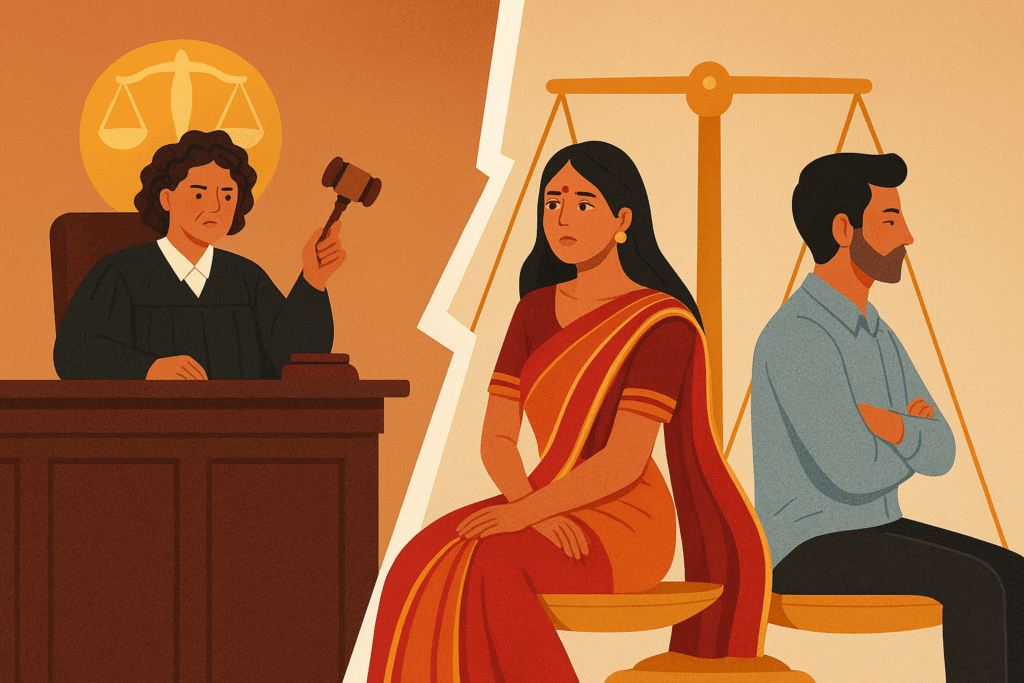Divorce involving Indian women residing in Canada presents a complex intersection of legal systems, personal laws, and international jurisdiction. Understanding the rights and processes in such cases is crucial for ensuring justice and protection for women navigating these challenging circumstances.
Divorce is a significant life event, and when it transcends national borders, it introduces layers of complexity. For Indian women married to Canadian citizens or residents, the legal landscape becomes multifaceted, involving both Indian and Canadian laws. This article delves into the rights of Indian women in divorce cases between Canada and India, focusing on jurisdiction, legal protections, and practical considerations.
Jurisdictional Challenges in Cross-Border Divorce
Indian Courts’ Approach to Foreign Divorce Decrees
India does not automatically recognize foreign divorce decrees. For a divorce obtained in Canada to be valid in India, it must meet specific criteria:
-
Jurisdiction: The foreign court must have had proper jurisdiction over the case.
-
Fairness: The proceedings must have been conducted fairly, adhering to principles of natural justice.
-
Consistency with Indian Public Policy: The grounds for divorce must not contravene Indian public policy.
If these conditions are met, Indian courts may recognize and enforce the foreign divorce decree. However, if the Indian spouse did not participate in the foreign proceedings or if the decree was obtained under circumstances that violate Indian public policy, it may not be recognized Sheokand Legal.
Canadian Courts’ Recognition of Indian Marriages
Canadian courts generally recognize marriages performed abroad, including those in India, provided they were legally valid in the country where they were solemnized. This recognition allows Indian women married in India to seek divorce in Canada if they meet the residency requirements .
Legal Protections for Indian Women in Divorce Cases
Alimony and Maintenance
In both India and Canada, women are entitled to financial support following a divorce. In India, the Hindu Marriage Act, 1955, provides for alimony under Section 25, considering factors like the wife’s financial needs, the husband’s income, and the duration of the marriage. Similarly, Canadian family law mandates spousal support, aiming to reduce financial hardship post-divorce.
Property Rights
Indian women may have rights to property acquired during the marriage, even if the title is in the husband’s name. Canadian law also recognizes the equal division of matrimonial property, regardless of whose name is on the title. This ensures that women are entitled to a fair share of assets accumulated during the marriage .
Child Custody
In both jurisdictions, the welfare of the child is the paramount consideration in custody matters. Indian courts typically grant custody to the mother, especially for younger children, unless compelling reasons suggest otherwise. Canadian courts adopt a similar approach, emphasizing the best interests of the child in custody decisions.
Practical Considerations for Indian Women in Canada-India Divorce Cases
Understanding Legal Systems
Navigating the legal systems of two countries can be daunting. It’s essential to understand the laws and procedures in both India and Canada to make informed decisions. Consulting legal professionals experienced in international family law can provide valuable guidance.
Language and Cultural Barriers
Language differences and cultural nuances can pose challenges in legal proceedings. Seeking assistance from translators and cultural liaisons can help bridge these gaps, ensuring clear communication and understanding throughout the process.
Emotional and Psychological Support
Divorce can be emotionally taxing. Accessing support networks, including counseling services and support groups, can provide the necessary emotional and psychological assistance during this challenging time.
Frequently Asked Questions (FAQs)
Q1: Can I get a divorce in Canada if I was married in India?
Yes, Canadian courts generally recognize marriages performed abroad, including those in India, allowing individuals to seek divorce in Canada if they meet the residency requirements.
Q2: Will my Canadian divorce be recognized in India?
For a Canadian divorce to be recognized in India, it must meet specific criteria, including proper jurisdiction, fairness, and consistency with Indian public policy Sheokand Legal.
Q3: Am I entitled to alimony after a divorce?
Both Indian and Canadian laws provide for alimony or spousal support, considering factors like financial needs, income, and the duration of the marriage.
Q4: How is property divided in a divorce?
In both India and Canada, property acquired during the marriage is subject to division. Indian women may have rights to property even if the title is in the husband’s name, and Canadian law ensures equal division of matrimonial property .
Q5: Who gets custody of the children?
In both India and Canada, the welfare of the child is the primary consideration in custody matters. Courts typically grant custody to the mother, especially for younger children, unless compelling reasons suggest otherwise
Divorce cases involving Indian women residing in Canada require careful navigation of both Indian and Canadian legal systems. Understanding the jurisdictional nuances, legal protections, and practical considerations can empower women to make informed decisions and ensure their rights are upheld. Seeking professional legal advice and support is crucial in such complex situations.




